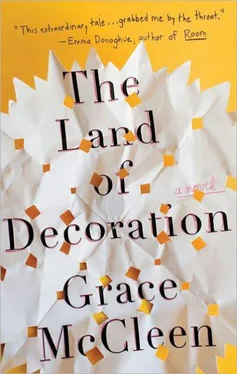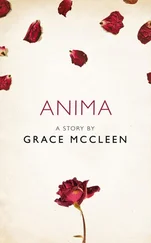That evening I said to God: “I’m not doing anything to him, but Neil is still angry.”
“There’s nothing you can do,” God said. “You set the wheel in motion. It’s easy to do things, not as easy to undo them.”
“Well, I’m not making anything else happen,” I said. “I’ll never make anything happen again!”
“We’ll see,” said God.
That week I didn’t make anything new in the Land of Decoration; I just told stories. I told a story about a red balloon that wanted to go higher and kept on going until it reached outer space but after a while couldn’t be sure which way was up anymore, or which way was in or out, or which way was the future and which way was the past and in the end it couldn’t be sure it was going anywhere at all.
I told a story about an Eskimo who caught an enormous fish and they became friends and the fish didn’t want to go back to sea. But it couldn’t live on land with the Eskimo, because it kept breaking the ice the Eskimo was standing on, so they made a boat from a whalebone and the fish towed the Eskimo away with him and neither was seen again.
I told a story of a fiddler who played so beautifully that even the birds in the trees began singing his songs back to him night and day. The only time they would be quiet was when he played to them, but he couldn’t play at night, and he couldn’t sleep, and he couldn’t eat, and finally he broke up the fiddle and ran away.
I told a story about a cornfield. The corn was green and called out to the sun to warm it. The sun warmed the corn and the corn became yellow. The corn thrust itself into the sky. It blossomed, it jostled, it fingered the blue. “Warm us some more,” it said. The sun licked the corn heads. The corn became darker. It chattered and rustled. A little smoke appeared at the edge of the field. A little flame too. “Warm us some more,” said the corn. The flames were made of a sports drink wrapper. They spread as the wind carried them. The corn began to crackle. Someone rode to the nearest town and rang the bell in the square. People came from all around with buckets and hoses and kettles and tanks full of water. But though they worked all afternoon and though the corn cried out to the sun that it was burning, the sun did not stop; soon there was nothing left but a space where a field used to be.
* * *
THE LAND OF Decoration seemed to me to be getting uglier. I couldn’t remember why I ever began making it. The streets looked jumbled, the fields brown, the rivers dull, the sun just a bulb, the mirror sea a stupid idea. Perhaps it was always like this, I thought. I wondered what other things I had not been seeing clearly.
It occurred to me that I had been worrying about Neil Lewis when all along I should have been worrying about Father. On Wednesday I went to the corner shop after school to buy sweets, and a newspaper said: VIOLENT CLASH BETWEEN PICKETERS AND WORKERS LEADS TO THREE ARRESTS. It had a picture in it of a man lying in front of a lorry, which was driving through the gates at the factory, and there were police with shields and helmets and horses fighting men with baseball bats and dustbin lids. A man with blood coming down his face was being held by the back of his sweater. I was so surprised I just stood there. Father hadn’t told me about any of that.
I went to the top of the road and looked down the hill to the factory and I saw how strange it was really, like a sleeping beast, a black thing with funnels and towers and ladders and pipes and above it these huge clouds of smoke like clouds of breath. And somewhere inside it was Father.
* * *
THE BOYS KNOCKED every night, but Father no longer went outside. There were more boys than I had seen before, the big boys, about four or five of them, and there was Neil in the midst of them, spitting and swearing and riding on the others’ backs. Father phoned the police, but by the time they arrived the boys had ridden away. It became a game with them to scarper down the backstreets as soon as they heard the cars. The police found nobody, we went to bed, the boys came back, and it all began again.
On Thursday night something different happened. There wasn’t any knocking, just a flip of the letter box. Father waited a minute, then went into the hall. He was standing by the door with a piece of paper in his hands.
“What’s that?” I said.
Father’s face was blank. “Nothing,” he said. “Nothing.”
“Is it a note from the boys?” I said.
Then Father said: “Judith. Please.” As if he was hurt, as if I was hurting him. He had never spoken to me like that before, and I went back to the kitchen.
“I’d like you to send up a car,” I heard him say. “They are still here…. Yes … I can’t say over the phone.” He was silent for a minute. When he spoke again it was quieter. He said: “Let me tell you, you are making a big mistake…. Yes … I certainly will. I’ll bring it down first thing.”
“You’re taking that note to the police station?” I said when he came back into the kitchen.
“Judith, I would prefer it if you didn’t listen when I’m talking on the phone.” He threw some more coal in the Rayburn, then shut the door firmly and said: “From now on I don’t want you walking to school the back way anymore; go along the main road, all right? And don’t go out of the playground at lunchtime.”
“OK,” I said.
“And keep out of that boy’s way. He’s not a nice individual. I’m going to speak to the school tomorrow; if the police can’t do anything, maybe they can.”
“Really?” I said. I began to feel sick.
“Yes,” he said. “This has to stop.”
We were sitting by the Rayburn a few minutes later when something hit the front door hard. There were shouts. The voices sounded older than Neil and Lee’s, and there was laughter. There was another blow to the door and we heard the bushes crash in the front garden. Father cleared his throat once, sharply, and it sounded to me as if he couldn’t get his breath.
We were both very still as the noises went on and the air around us seemed to be getting thinner and more difficult to breathe. It went on, and on. And on. I didn’t understand how noises could paralyze you, but that’s what they were doing. I wanted to move more than I’ve ever wanted anything in my life, but I couldn’t. Father’s skin looked as if someone was tightening it at the sides of his head. Suddenly he jumped up and went to the dresser. He took down the Bible, opened it, and handed it to me. “Read it,” he said.
“What?”
“Read.”
“Where from?”
“Anywhere.”
When I still looked at him, he said: “Go on!”
“Therefore thus saith the Lord concerning the king of Assyria: He shall not come into this city, nor shoot an arrow there, nor bare a shield before it, nor erect a rampart against it. By the way that he came, the same way he shall return, he shall not come into this city, saith the Lord.”
“Louder,” Father said.
“For I will defend this city, and save it, for my sake, and for the sake of my servant David. And it came to pass that night that the angel of the Lord went out and smote in the Assyrian camp a hundred and fourscore and five thousand: and when they arose early in the morning, look, there was not one living.”
“Louder!”
But my throat ached as if it was in a vice. Father snatched the Bible and began reading himself. He held the book away from him and read in a clear voice with his chin raised. He read till the hall clock chimed nine, through the laughter and voices outside, and I kept my head bowed.
A police car arrived again just after nine, but Father hadn’t called it this time. I wondered who had and thought perhaps it was Mrs. Pew or Mr. Neasdon.
Читать дальше












